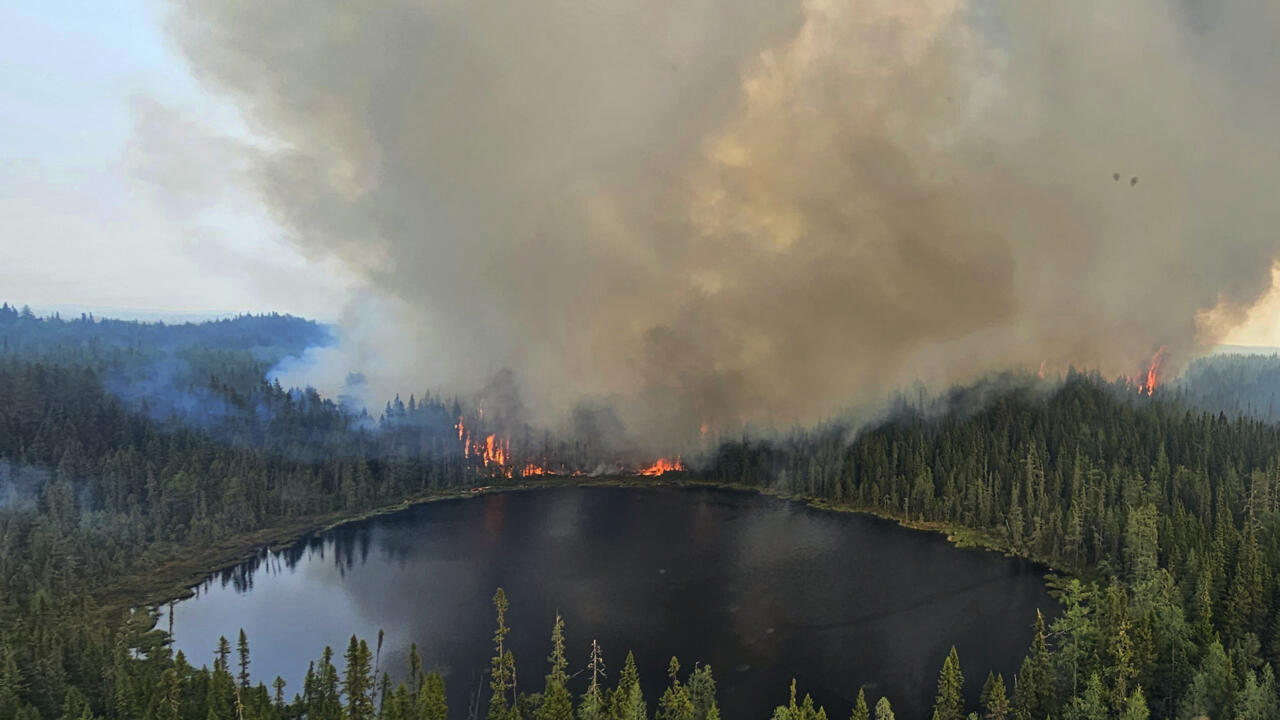Fires in Canada: The Gigantic Logistical Challenge in the Face of Flames
In Canada, hundreds of fires are still raging, particularly in Quebec. Provinces further west, such as Alberta, British Columbia and Saskatchewan, were affected as early as early May. Local forces in the provinces are often overwhelmed, as the country does not have a national fire force.
Image released by the Ontario Ministry of Natural Resources and Forestry: The Chapleau 3 wildfire burns near Chapleau Township, Ontario, Sunday, June 4, 2023. AP - HO
Text by: RFI Follow
Advertising
Read more
In Canada, forest fires are managed by each of the ten provinces and three federal territories. Under the current system, provinces and territories exchange resources when one or the other is dealing with fires, fires that are now too numerous over too much of Canada for this system to work.
Each called on not only the Canadian military, but also foreign countries: the United States, France, Australia, New Zealand and South Africa have sent firefighters to help local firefighters and the army.
Avoid dependence on foreign aid
Canada's Minister of Public Safety emphasized this week that the Canadian Wildfire Centre is coordinating all these resources and finding others. But what many experts are asking for above all is the creation of a national fire department to avoid depending on foreign aid and thus be able to get to the scene very quickly and stop these extreme episodes when they are about to start.
In any case, the debate is launched: according to The Canadian Press, discussions are underway within the federal government on a "new approach".
♦ Report: Residents of Obejwan's indigenous community evacuated
So far, in northern Quebec where fires continue to rage, 13,000 people have had to leave their homes and will not be able to return home, in the best case, until Tuesday, June 13. Among these evacuees are 300 residents of the indigenous community of Obejwan, located in the middle of the forest, two hours from the road. It was the smoke that forced their departure.
Between strollers for toddlers and walkers for the elderly, the entrance to this Roberval hotel has nothing of its usual look, says our special correspondent Pascale Guéricolas. This is where young families, but also elders from the Indigenous community of Obejwan found refuge, as educator Shona Clairé explains: "The most vulnerable people, including those with lung problems, respiratory problems, cancers, pregnant women, were evacuated here for prevention, because there was a lot of smoke in the community. We have snacks for babies, we have received donations in diapers, loans of playpens, strollers. I think we are well organized, we do the best we can.
»Francine pushes her 86-year-old mother's wheelchair and ensures that other patients, transferred from a nursing home, do not fall. "There are nurses who come here for blood pressure checks, blood glucose tests," she explains. We couldn't really take what we usually take there to the Maison des aînés because it was fast. »
The hasty departure has limited equipment for seniors, but local social services are gradually equipping the hotel, which almost looks like Epahd.
New York, from the Empire State Building Observatory, Wednesday, June 7, 2023. AP - Yuki Iwamura
Smoke continues to spread across the U.S.
The smoke from the fires in Canada has moved and continues to affect the United States. Some 100 million Americans breathe poor air quality, according to local authorities. Some American cities, even though hundreds of miles away, are experiencing unprecedented levels of pollution alerts. In Baltimore, in the northeast of the country, Jasmine woke up Thursday morning, June 8 in shock, discovering her city totally smoky.
«
When I went for a walk in my dog this morning, I was overwhelmed by the smell of burnt wood. There is smoke where I live, she testifies by phone to Édouard Maille. Usually, when I go to work, the buildings in Baltimore are very visible, but there the smoke is so misty that we could not even see them, or what was in front of us. And the smoke is very, very dense, and it's getting denser and denser. Usually, my kids walk to school, but this morning I didn't allow them to walk, I took them, and they wore a mask just in case. I am very worried because I have family with health problems like asthma and the air quality is so bad that they have to stay home.
»In New York, people are very worried, even though we are still quite far from Canada. For so much smoke to have come this far, this is unheard of. People are worried and have a lot of questions. The media talk about it a lot, but in fact they don't explain much...
Testimony of Alexandre Szymanek, resident of New York
Jelena Tomic
Newsletter Receive all the international news directly in your mailbox
I subscribe
Follow all the international news by downloading the RFI application
Read on on the same topics:
- Canada
- Quebec
- United States
- Natural disasters

